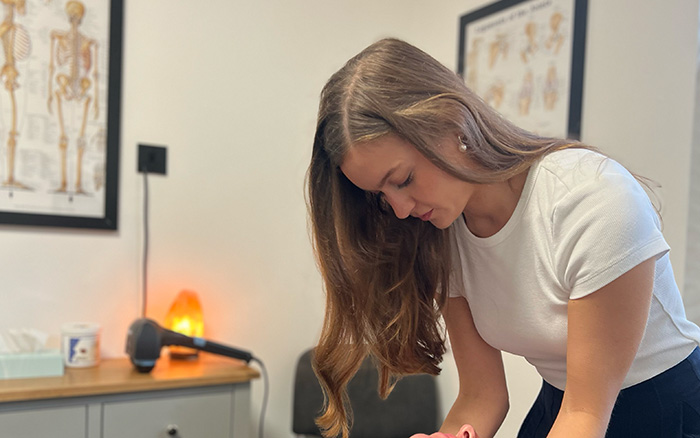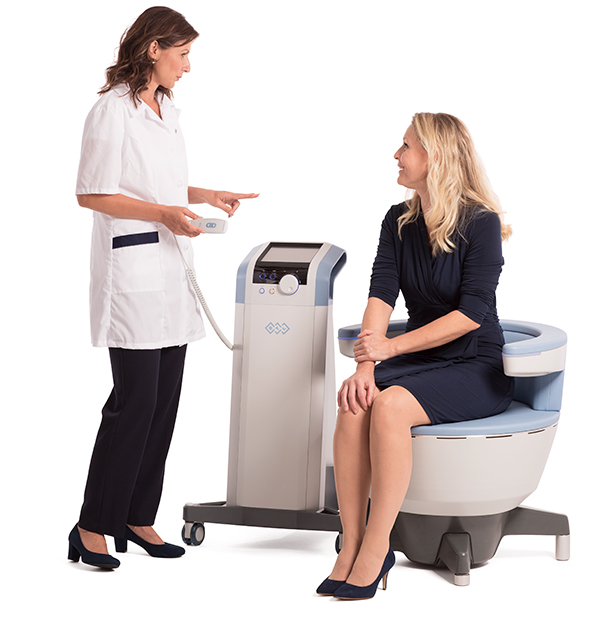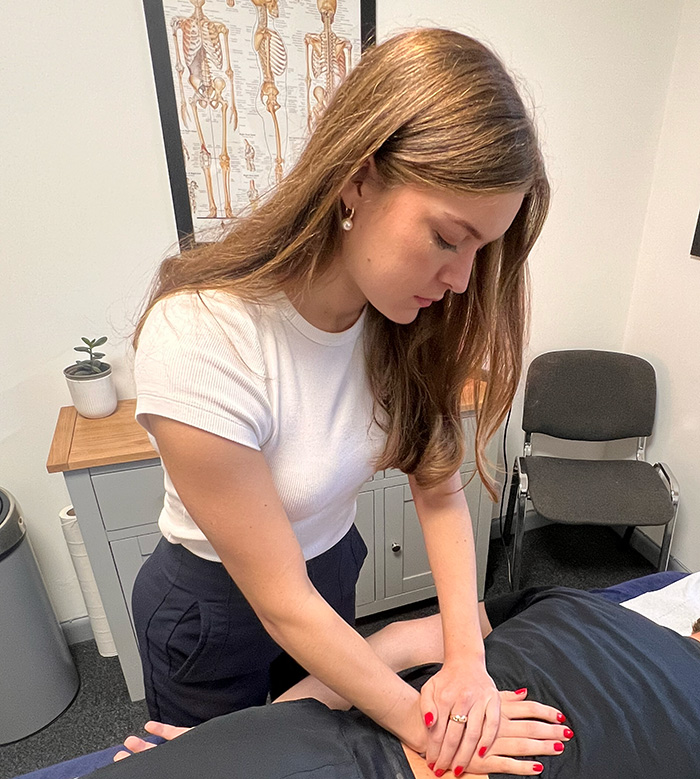Littlehampton Natural Health Centre
Welcome to the Littlehampton Natural Health Centre, a multidisciplinary clinic offering various health treatments, with our specialist Pelvic Floor Physiotherapist Amelia Altenburger, who is available to help with all manner of female health concerns including stress incontinence, urge incontinence, abdominal pain, urinary leakage, and urinary urgency, pelvic pain, pelvic floor dysfunction, sexual dysfunction and much more.
Welcome To Physiotherapy!
When visiting our clinic in Littlehampton you will be greeted with a big smile by our receptionist! We invite you to make yourself feel at home in our waiting area while you wait. We advise all our patients to arrive at least 5 minutes prior to their appointment; this will allow time to settle into the clinic before the start of an appointment.
We have plenty of on-street parking located in close proximity to the clinic, directly out the front of our clinic and many roads surrounding, making access and parking for our patients easy and stress-free.
If it’s your first Pelvic Floor Physiotherapy appointment, or we haven’t seen you for a few years, we like to spend some time getting to know you, or catching up on your life and health situation. This will include an informal chat, a personal history (including details on any past injuries, current medication, and any related conditions), and of course your reason for visiting the clinic. Once we have all the relevant information, your Physiotherapist will determine what tests and investigations may be required to help find the root cause of your symptoms. They will then explain their findings and the necessary stages to help you recover to normal function. If you and your Physiotherapist are both happy to proceed and no further information is required, your treatment can then be offered.
Our Specialities
Our Pelvic Floor Physiotherapist can help with my issues including;
- Stress Incontinence
- Urge Incontinence
- Pelvic Pain
- Urine Leaking
- Abdominal Pain
- Exercise Prescription
- Stretch Prescription
- And much more!

What is Pelvic Floor Physiotherapy?
Pelvic Floor Physiotherapy focuses on the enhancement of pelvic floor function. The pelvic floor muscles play a crucial role in core stability, bladder and bowel control, sexual health, and support of the pelvic organs. Pelvic floor health is integral to overall physical well-being, quality of life, and daily functioning.
The primary goal of pelvic floor physiotherapy is to assess, treat, and rehabilitate the pelvic floor muscles to restore function after conditions like childbirth, surgery, chronic pain, or conditions like incontinence or prolapse. It can significantly aid in the restoration of pelvic floor function by helping individuals regain control and strength in their pelvic floor muscles following trauma, surgery, or chronic conditions. It can also help with pain management, treating various types of pelvic pain, including chronic pelvic pain, pain during intercourse, or pain associated with the bladder or bowel.
A pelvic floor physiotherapist adopts a holistic approach, considering not just the symptoms but the complete health profile of the individual. This comprehensive assessment ensures that treatment is personalised, involving the patient directly in their care journey, aiming not only for symptom relief but also for long-term health maintenance.

Our Patients
There are many reasons why patients come and visit the clinic. Some will originally visit us needing help with issues such as post-operative recovery, injury rehabilitation, frozen shoulder, hip pain or stiffness, knee pain, ankle pain, or arthritis, but once they are well again, many will keep coming back as the Physiotherapy care they receive makes them feel great and keeps them functioning at their best!
We are passionate about sports! Not only do we see patients with sports injuries, but also lots of patients who understand how Physiotherapy can improve performance in their chosen sport. Many top athletes have Physiotherapists as part of their teams to help them to maintain their optimum function, injury recovery & improve performance.
Physiotherapy is a mainstream healthcare profession that helps people from all walks of life.
What is the cause of your Symptoms?
The Pelvic Floor is a complex web of muscles, tendons, and nerves. When everything works as it should, everything seems effortless and smooth. However, when one part of this web stops working as it should; normal function turns to dysfunction, which in turn leads to pain, urinary dysfunction, prolapse, tightness, discomfort, and many other related symptoms.
Our Pelvic Floor Physiotherapist looks to diagnose the main underlying cause of your symptoms and treat these accordingly. To find the cause we take a full case history, and perform a physical examination. Should your Pelvic Floor Physiotherapist determine that further investigation is necessary, they can refer you for diagnostic testing locally. There may be times when we may need to refer you back to your GP for further tests.
Your Pelvic Floor Physiotherapist will use effective techniques to help restore the strength, tone, and biofeedback to the muscles of your pelvic floor muscles.

Meet our Pelvic Floor Physiotherapist
Pelvic Floor Physiotherapist in Littlehampton - Amelia Altenburger
Amelia graduated from The University of Chichester with a Bachelor’s degree in Physiotherapy and is registered with the HCPC. Amelia is passionate about women's health, pelvic health, and focusing on helping patients with pelvic floor dysfunction and other related conditions. Amelia has completed pelvic floor training with both Mummy MOT and POGP, giving her the knowledge and skill set to help her patients recover from all manner of Pelvic Floor Dysfunction.
She has a particular interest in female health, pelvic floor, and post natal recovery, with a speciality in helping patients with pelvic floor dysfunction and other related conditions. Amelia’s passion for physiotherapy stems from a young age, which sparked a deep interest in understanding the body's healing processes and helping others regain their strength and confidence. Amelia’s approach combines her experience, and academic knowledge, combined with a compassionate attitude. Amelia looks at the whole person and takes all factors into account when creating a personalised treatment plan, aimed at improving her patients' overall well-being.
Outside of her work, Amelia enjoys running and believes in the power of an active lifestyle to promote physical and mental well-being. Committed to professional development, Amelia is dedicated to providing the highest standard of care and support to her patients as they work towards their health and wellness goals.

Common Symptoms
Pelvic floor dysfunction can cause a variety of symptoms, some of the most common are listed here. Pelvic Floor Physiotherapy can help to increase the tone and strength of the pelvic floor, improving symptoms and quality of life.
Stress Incontinence

Painful Sex

Urge Incontinence

Exercise Incontinence

Pelvic Pain

Urine Leakage


Book Your First Appointment Online
If you are ready to start your journey back to health, you can book your First Pelvic Floor Physiotherapy appointment in multiple ways. You can either call our friendly reception team on 01903 734373, or you can click the link below to go to our Online Booking page. The ability to book online isn't just available for new patients, this can also be used to book future Physiotherapy appointments, allowing you the flexibility to book appointments at your leisure and from anywhere.
After booking your appointment, you will be sent 2 emails; the first will simply confirming your appointment is booked. The second will include a link where you can complete your New Patient Intake questionnaire, completing this prior to your appointment will allow your Physiotherapist to review the information before sitting down to consult with you.


Checklist for New or Returning Patients:
If it is your first time visiting the clinic, or if you haven’t seen us for a few years, we like to spend some time going through your current and previous health and lifestyle, catching up, and ensuring we have a full view of your history. Below are some of the details you will need to complete on your Online Intake Form, or will need to bring along to your New Patient Appointment.
- List of current medications and dosage
- Details of diagnosed conditions (including dates)
- Details of operations and other medical procedures (including dates)
If you are able to complete the Online Intake Form prior to the appointment, this will give your Physiotherapist enough time to review these details prior to your appointment. If not, your Physiotherapist will run through these with you at your appointment and have the opportunity to review them in-depth prior to your next appointment, more information about these initial appointments is discussed below.

First Appointment - Initial Consultation
Your Pelvic Floor Physiotherapy journey starts here... when you book your first appointment we will email you an online health questionnaire, helping your Pelvic Floor Physiotherapist to build a complete picture of who you are and why you are coming to see us. When you visit the clinic we will ask you to complete one more form, giving your Pelvic Floor Physiotherapist as much information about your symptoms and reason for visiting the clinic.
Your Pelvic Floor Physiotherapist will then consult with you about your symptoms, how they started, and what makes them better or worse, discuss any previous treatment you have tried and ask some specific questions to help them determine their next course of action. Once your Pelvic Floor Physiotherapist is happy and they have all of the information about you and your symptoms, they will then proceed with the physical examination.
The physical examination will often start with an external assessment of your abdominal region, assessing how the abdominal muscles interact and contribute to breathing patterns, abdominal muscle activation, tension, core and pelvic floor coordination and any scars or adhesions; helping your Pelvic Floor Physiotherapist to identify the causes contributing to your pelvic floor issues. Pelvic Floor Physiotherapists are experts in assessing and treating conditions related to your pelvic floor by specialising in education, lifestyle changes, exercises and stretches. The second part of the physical examination is a possible internal assessment which involves gentle vaginal evaluation, assessing muscle function, muscle tone, prolapse, and detecting any areas of tightness and scarring.
Once your Pelvic Floor Physiotherapist is happy and has all the necessary information to assess your case, they will discuss their initial findings, and if you are both happy, they will proceed with your first treatment. This treatment is viewed as part of the examination, as once the Pelvic Floor Physiotherapist has located causing of your symptoms, they will then want to see how your body, function, and symptoms respond to their initial treatment.
After your first treatment, your Pelvic Floor Physiotherapist will recommend a treatment plan aimed at rehabilitation, restoring your function, and addressing your symptoms.

Report of Findings
Following your examination and first treatment, your Pelvic Floor Physiotherapist will then recommend the most appropriate treatment plan aimed at rehabilitation, restoring your function, and addressing your symptoms. These treatment plans are different for each patient and typically follow this rough structure;
Phase 1; the first phase of care is typically focused on restoring neurological connection from your pelvic floor to your brain. This will often include specific at-home stretches and exercises to encourage and maintain optimal pelvic floor strengthening and start to rebuild the muscle strength between each of your Pelvic Floor Physiotherapy treatments. This first phase of care is typically the most intensive phase of care, lasting from 2 to 4 weeks and with treatments 1 to 2 times per week. The exact frequency and length of the first phase are determined on a case-by-case basis and personalised to your recovery plan.
Phase 2; following the successful completion of the initial phase of care, you will then move into the second phase, which is focused on further increasing strength and stability to the pelvic floor where it is most needed. These will complement the stretches and exercises given in the first phase, helping to increase muscular tone, strength, and stability. This second phase of care is typically at a lesser frequency of treatment, lasting from 2 to 8 weeks and with treatments every 1 to 2 weeks apart. The exact frequency and length of the second phase are determined by how you have responded to the first phase of care and personalised to your recovery plan.
Phase 3; by the end of the second phase of care, we would expect the majority of patients to be well on the path to recovery, experiencing reduced symptoms, improved ability, feeling stronger and more stable, and overall experiencing higher levels of well-being. The third phase of care is different for each individual, we typically have two directions from this point; some patients will be discharged at this stage, with either your Pelvic Floor Physiotherapist or yourself feeling like they have achieved everything you wanted. For those not continuing treatment, we still suggest a continuation of regular stretching and strengthening exercises to maintain your progress. In some cases, a maintenance schedule of care can be recommended, aimed at maintaining your motion and function over a longer period of time. This can be important in as this area can be prone to regression far quicker, and can be harder to self-manage through only stretches and exercises. At the end of your second phase of care, your Pelvic Floor Physiotherapist will consult with you on all options, allowing you to make an informed decision on the best path forward for yourself

What Does Treatment Involve?
Pelvic floor Physiotherapy treatment can involve many different forms of care. For the most part treatment centres around stretch and exercise prescription, core stability and reduced pain, aimed at restoring optimal function by increasing strength and reducing symptoms; allowing your body to heal and restore pelvic floor function.
Patients visit Pelvic Floor Physiotherapists for many different reasons and with varied symptoms. Common reasons people visit Pelvic Floor Physiotherapists include (but are not limited to) feeling a bulging sensation, pain or discomfort, urinary or urge incontinence, leakage, pre and postpartum rehabilitation, and pregnancy care, among many others.
Pelvic Floor Physiotherapy isn’t only useful for acute or chronic conditions, Pelvic Floor Physiotherapists can also help prevent problems by pinpointing potential sources of symptoms before they develop further. Prevention is always better than the cure, so maintaining your body's movement and function is key to a healthy pelvic floor in the long term.
Pelvic Floor Physiotherapists do not only focus on treating the symptomatic area but use a combination of abdominal exercises and manipulation techniques to help increase blood flow, neurological connection, overall strength and flexibility. Pelvic Floor Physiotherapy wants all systems in the body to work together, providing overall good health and well-being. At our clinic in Littlehampton, our Pelvic floor Physiotherapist Amelia Altenburger treats a variety of symptoms.
For most patients manual care is just one part of your treatment plan; your Pelvic Floor Physiotherapist will also provide education, advice, and various exercises and stretches to empower you to help yourself!



Physiotherapy Techniques offered
Exercise Rehabilitation
Exercise rehabilitation focuses on strengthening and improving coordination for the muscles of your pelvic floor. To address issues like incontinence, leaking, sexual dysfunction, pain and prolapse.
EmSella Treatment
EmSella Treatment is a non-invasive medical device that uses high-intensity focused electromagnetic (HIFEM) technology to stimulate pelvic floor muscles. It helps improve pelvic floor strength, urinary incontinence and sexual dysfunction and is a safe and effective treatment for a range of pelvic floor disorders. EmSella works by delivering electromagnetic waves to the pelvic floor muscles, causing them to contract and relax rapidly.
Stretching Rehabilitation
Stretching rehabilitation focuses on improving flexibility for overactive muscles and reducing tension and tightness in your pelvic floor. To improve pelvic pain, incontinence and prolapse.
Pelvic Floor Muscle Stimulation
Pelvic floor muscle stimulation is using devices to help to activate and relax your pelvic floor muscles. These devices help to improve overactive muscles, stimulate weak muscles and improve muscle awareness by learning to engage or relax your pelvic floor muscles.

FREE Assessment
If you are unsure whether Pelvic Floor Physiotherapy is the right option for you, we would like to invite you to attend a FREE Assessment. This is an opportunity for you to come and consult with our Physiotherapist at NO charge. What does the FREE Assessment entail and how could it help you?
- Intake Form - prior to the appointment we are going to ask you to complete a new patient intake form, this will provide your Pelvic Floor Physiotherapist with your health and lifestyle background, allowing them to build a complete picture of your health.
- Primary Complaint Form - this will be completed at the clinic before your appointment, this form focuses on your symptoms and reason for visiting the clinic. It will ask questions about where your symptoms are, what they feel like, when and how they started, and other relevant questions.
- Consultation - this is where your Pelvic Floor Physiotherapist will discuss your symptoms, and ask leading questions which will help them to gain all relevant and required information to determine the best and most appropriate course of action.
- Examination - after your Pelvic Floor Physiotherapist has all of the information they require, they will then perform a brief examination to assess your range of motion, muscle tension, and function and try to determine which areas are causing your symptoms.
- Explanation of Findings - after your Pelvic Floor Physiotherapist has consulted with you and examined your body, they will then explain their initial findings and what they recommend next.
Book Your FREE Assessment
To book this FREE Assessment appointment, please either call us at 01903 734373, or you can Book Online by either clicking the link below or following the steps on this page.

What's Next?
If after your consultation and examination, your Pelvic Floor Physiotherapist is satisfied that they are able to help you and you would like to start your recovery journey, they will then explain the next stages. This could include a more thorough examination of your body, or any need to refer for further testing. Once they have all the information required, they will look to provide your first treatment. If you do decide to proceed with treatment or any diagnostic testing, these will be chargeable and any costs will be discussed fully with you before proceeding.
To book this FREE Assessment appointment, please either call us at 01903 734373, or you can Book Online by either clicking the link below or following the steps on this page.

The Reception staff - Carly, Lana and Nancy are very helpful and friendly too.
This has been my first experience of visiting a chiropractor and my I was put totally at ease and everything was explained well before procedure took place.
Frequently Asked Questions
Pelvic Floor Physiotherapy is a style of manual therapy that aims to rehabilitate injured and dysfunctional muscles of your Pelvic Floor. Its methods encourage optimal tone and strength of the pelvic floor muscles, keeping soft tissue loose but supportive and educating at every step. Pelvic Floor Physiotherapy includes a broad range of techniques, each with its own role in helping aid your recovery and improving your comfort. No. We view every patient on an individual basis and formulate treatment plans to suit them. On some visits there may only be one or two areas that require treatment, however, sometimes there may be many areas and other parts of the body that may require attention. We recommend that you preferably wear comfortable, loose-fitting clothing. Please keep in mind that your Physiotherapist will need to visually assess and in some cases may need to perform an internal examination of your Pelvic Floor. Physiotherapists have to complete a 3-year Batchelor of Science Degree in Physiotherapy. Over the course of this degree, they study human anatomy, physiology, neurology, pathology, rehabilitation, differential diagnosis, patient assessment, and exercise & stretch prescription. Over the three years, Physiotherapists develop their practical skills working on patient assessment, physical screening, and safe effective treatment. Once qualified the learning doesn’t stop, with Amelia completing extensive Continuing Professional Development, which includes further training courses, research, and many other learning activities. Specifically Amelia has completed the Mummy MOT and POGP Pelvic Floor training. No, there are vast differences between Physiotherapy and Sports Massage. Physiotherapists receive degree-level training and are able to assess and diagnose issues with much more accuracy. Although Physiotherapy does utilise massage techniques when required to help aid in a patient’s recovery, however, the whole treatment offers far more than a standard Sports Massage is able to provide. Yes. Your Physiotherapist has completed over 3 years of training and has many years of experience in practice. Physiotherapists are experts in assessing and correcting dysfunctional and injured soft tissue and joint issues. Physiotherapists also have to complete regular Continual Professional Development to keep up to date with the latest research and techniques.

EmSella Pelvic Floor Therapy
We are also able to refer for EmSella Pelvic Floor Therapy
Amelia also works alongside our sister clinic in Chichester, where she can refer patients to use the EmSella chair. EmSella is a non-invasive medical device that uses high-intensity focused electromagnetic (HIFEM) technology to stimulate pelvic floor muscles. It is designed to help improve pelvic floor strength and treat urinary incontinence and sexual dysfunction in both men and women. This innovative technology has been gaining popularity as a safe and effective treatment for a range of pelvic floor disorders.
EmSella works by delivering electromagnetic waves to the pelvic floor muscles, which causes them to contract and relax rapidly. This is similar to the contractions that occur during Kegel exercises, but the stimulation is more intense and targeted. The electromagnetic stimulation provided by EmSella is designed to improve the strength and tone of the pelvic floor muscles, which can help to improve urinary control and reduce urinary leakage.
EmSella treatment appointments typically last around 30 minutes, and most patients require a series of sessions to achieve optimal results. During the treatment, you will remain fully clothed, and sit on the EmSella chair. The EmSella then generates electromagnetic waves that stimulate your pelvic floor muscles, causing them to contract and relax rapidly. The sensation is often described as mild tingling or buzzing, and is not painful or uncomfortable.
Treatment is convenient and a good treatment option for those who want to avoid the risks and downtime associated with invasive procedures.
Prior to starting your treatment, you will have an in-depth consultation to help determine the most appropriate treatment plan for you.

Scientific research has shown that 95% of treated patients reported significant improvement in their quality of life.*
Walk-In & Out Procedure
![]()
Non-Invasive Procedure
![]()
Remain Fully Clothed
![]()
75% Less Pad Use
![]()

If you’re unsure whether Pelvic Floor Physiotherapy is the right option for you please come in for a FREE Assessment. To book this FREE Assessment, please either call us at 01903 734373, or you can Book Online by either clicking the link below or following the steps on this page.
Book Your FREE Assessment Call To Book - 01903 734373
Look forward to seeing you soon!
- Littlehampton Natural Health Centre


Find Us
Conveniantly Located in Littlehampton, West Sussex

simply click the link below and check availability.

